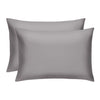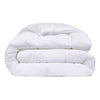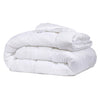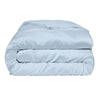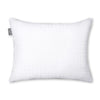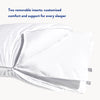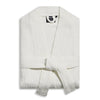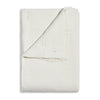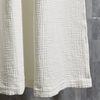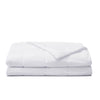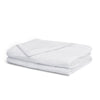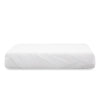The Daily Miracle
Quilt vs. Comforter: Which Is Better?
Published
June 03, 2022
Author
Nicholas Crusie

If you're in the market for a new bedding collection, you may be wondering what you should be looking for. While there are tons of different fabrics and styles you should take into account, one question stands out: Which is best, a comforter or a quilt?
It can be overwhelming to shop for bedding unless you are prepared with the necessary knowledge to help you make the best purchase. Instead of crossing your fingers and hoping for the best, here is everything you need to know about duvets, shams, fabrics, quilts, and comforters.
Proper sleep is so important for your mental and physical health. Anything that can help you get a deeper sleep is worth trying.
What Is a Quilt?
A quilt is the thickest type of bedding you can buy. Comforters have two layers of fabric (like duvets), but quilts have three.
Quilts have a top layer, a batting, and a bottom layer. If you're trying to envision a quilt in your mind, think back to your grandma's house. We bet she had a few quilts you used during sleepovers.
Quilts are known for their intricate designs. Traditional quilts use different pieces of fabric that are all sewed together in a grid, whereas modern, minimalist quilts generally use a simple monochromatic grid.
The bottom layer will be a solid color. Both sides won't have the same pattern, traditionally. Expect the quilt to be filled with polyester, wool, or down. Considering quilts are so thick, they're known for being very warm. Depending on personal preference, this may be a pro or con.
What Is a Comforter?
Unlike quilts, comforters consist of two identical sides. Comforters come with designs and patterns but are often found in one solid color. Comforters are probably the most popular form of bedding (rightfully so), so expect a ton of color options if you do decide to shop for a comforter after all.
The price of your comforter mostly depends on what material the filler is. The cheaper comforters are filled with polyester or wool, while the more expensive comforters are filled with goose or duck down.
Comforters still offer a good amount of insolation and warmth but shouldn't be overbearing, especially when compared to the traditionally heavier quilt.
What Are the Pros of Quilts?
To better help you decide which product you should purchase, we have formulated a pros and cons list for quilts and comforters.
Quilts Are Very Warm
Since comforters are as thick or lofty as quilts, they're usually layered during colder months. Quilts are extremely thick and will offer plenty of warmth.
It's not uncommon for people to use their comforter as their primary blanket while using their quilt only a few of the cold months — it never hurts to have options.
Quilts Have a Rich History
Quilts are a huge part of American history. Quilts were used to cover dirt walls and floors as settlers moved west. The patterns became more intricate, representing friendship, romantic love, or religious devotion. Quilting was an incredibly popular pastime; even US presidents Dwight D. Eisenhower and Calvin Coolidge quilted with their mothers.
Quilts Are Available in Coordinating Sets
Everyone wants their room to have the perfect color schemes, so buying bedding that can all match may be a top priority. While traditional quilts may have been harder to match up to the rest of your bedding, you can expect them to come in tons of modern and stylish forms today.
What Are the Cons of Quilts?
No one is perfect, including quilts!
Here’s why:
Quilts Can Be Difficult To Wash
Considering quilts are even thicker (and heavier) than comforters, they can be a pain to wash.
Quilts, even new ones, should be hand-washed. Machine washing quilts can cause the thread to unravel, causing your plan to relax in bed to totally unravel as well.
Washing and folding laundry isn't the most fun activity (in our opinion), so any way we can do less laundry definitely has our interest.
The only way to get around washing your sheets every week is by using self-sanitizing products. Self-sanitizing bedding is also known as antibacterial bedding. Antibacterial bedding helps prevent the spread of 99.9 percent of bacteria and germs.
However, we'll talk more about this in a minute — for now, let's talk about quilts.
Quilts Can Get Too Hot
Quilts are very warm, but they may be too warm for some people. Quilts aren't temperature regulating, so they may become too hot to sleep with — friend during the winter, foe during the summer.
What Are the Pros of Comforters?
While we're comforter lovers through and through, we may be a bit biased — but we say rightfully so.
Here’s why:
Comforters Are More Versatile
You want a blanket that will keep you comfortable throughout the night (and year). Comforters work great all year round because you can layer them.
They may not offer as much insolation as a quilt, but that's not to say you can't just layer up.
Simply sleep with your comforter and a throw blanket; we bet you'll be plenty warm.
You may regret buying a quilt post-groundhog day once the temperatures rise.
Comforters Result in Less Laundry
You should wash traditional bedding around once a week. We spend a lot of time in our beds, so it’s no wonder they can collect germs, bacteria, and other unpleasant things.
Washing bedding in warm water can help keep your bedding clean. Then, add in a hypoallergenic detergent for a skin-friendly solution to traditional irritants.
Using our Miracle Made antibacterial comforter, you can expect three times less laundry than normal. How? It’s simple: our products are infused with silver, which is a natural antimicrobial. Silver acts as a weapon against unwanted microbes.
There are more benefits than just less laundry. Self-sanitizing bedding is good for your allergies and skin. With fewer bacteria and buildup on your sheets and blankets, you may see a change in your allergies and skin appearance. The results are in: Silver is the new gold standard.
Comforters Feel Fluffier
This isn't to say quilts are soft and comfy, but you truly can't beat the feeling of a warm, fluffy comforter. As long as you use a comforter made with high-quality cotton and down, you can expect comforters to be a bit more cozy feeling than quilts.
Time To Choose
Now that you're knowledgeable on all things comforter, quilt, and duvet, it's time to make a decision — comforter or quilt?
Of course, we don't want you to rush to any conclusions, so we suggest taking your time and weighing out your options. Quilts are great if you want something warmer, but comforters may be more versatile. Some people love having both!
No matter what you decide, we wish you sweet dreams and many amazing nights of rest to come.


